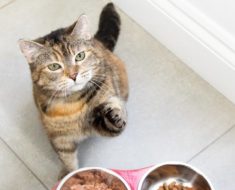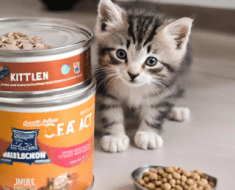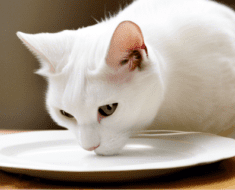In the world of feline health, maintaining an optimal weight is crucial for the well-being of our beloved cats. Just like humans, cats can face challenges related to weight, and as responsible pet owners, addressing these issues becomes paramount. In this article, we’ll delve into the importance of homemade cat food specifically tailored for weight gain.
Table of Contents
ToggleImportance of Homemade cat food to Gain weight for your Kitty
Crafting homemade cat food becomes a love-infused journey, nurturing your feline’s heart and health. This personalized culinary venture, rich in proteins and wholesome fats, is a symphony of care, aiming to embrace your cat’s well-being with every delicious bite. The gradual transition unveils a story of trust and companionship, creating not just a fuller cat but a happier, healthier soul. Success stories resonate with the joy of witnessing your cherished pet thrive on this heartfelt approach. As you embark on this emotional and nutritious expedition, relish the joy of being a chef for your cat’s happiness and vitality. Witness the magic unfold with every homemade morsel!
Introduction
Cat nutrition is a multifaceted aspect of pet care. As cat owners, we ensure that our feline companions receive a well-balanced diet that meets their unique needs. Among the various aspects of cat nutrition, weight management holds a special place. Achieving and maintaining a healthy weight is vital for a cat’s overall health and longevity.
Common Challenges in Cat Weight Management
Identifying weight-related issues in cats can be challenging, yet it is essential for their health. Cats, like humans, can suffer from obesity or, conversely, struggle with being underweight. Both scenarios pose risks to their well-being and can lead to various health complications.
Understanding the Benefits of Homemade Cat Food
While commercial cat food options are readily available, there’s a growing interest in homemade cat food for its numerous benefits. When it comes to weight gain, homemade food allows cat owners to customize their feline friend’s diet, tailoring it to their specific needs.
Nutritional Requirements for Weight Gain in Cats
To understand how homemade cat food aids in weight gain, it’s crucial to recognize the nutritional requirements for feline weight management. Proteins, fats, and carbohydrates play pivotal roles in a cat’s diet, especially when the goal is to encourage healthy weight gain.
Recipes for Homemade Weight Gain Cat Food
Creating homemade cat food for weight gain involves incorporating ingredients rich in proteins and healthy fats. Protein is essential for muscle development, while healthy fats provide the necessary caloric boost. Here are some simple yet effective recipes to try:
Tuna and Chicken Delight
Ingredients:
- Canned tuna in water
- Cooked and shredded chicken
- Olive oil
Instructions:
- Mix tuna and shredded chicken in a bowl.
- Drizzle with a teaspoon of olive oil for added healthy fats.
- Serve in small portions to monitor intake.
Salmon Surprise
Ingredients:
- Cooked and flaked salmon
- Quinoa
- Spinach (finely chopped)
Instructions:
- Combine flaked salmon, cooked quinoa, and chopped spinach.
- Form small patties and bake until firm.
- Cool before serving to your cat.
Transitioning to Homemade Cat Food Safely
Transitioning to a homemade diet requires a gradual approach. Abrupt changes can upset a cat’s digestive system. Start by mixing small amounts of homemade food with their regular diet, gradually increasing the proportion until they are fully on the homemade diet.
Avoiding Common Pitfalls in Homemade Cat Diets
While homemade cat food offers numerous benefits, avoiding common pitfalls is essential. Maintaining a balance in nutrient proportions is crucial. Cats require specific nutrients in specific ratios, and an imbalance can lead to health issues. Consultation with a veterinarian is highly recommended to ensure a well-rounded and safe homemade diet.
Success Stories: Cats Thriving on Homemade Diets
Real-life examples of cats thriving on homemade diets provide powerful testimony to the benefits of customized nutrition. Cat owners who have transitioned to homemade diets often report increased energy, shinier coats, and overall better health in their feline companions.
Cost-Effective Nature of Homemade Cat Food
Contrary to popular belief, providing homemade cat food can be cost-effective. While there may be an initial investment in purchasing quality ingredients, the long-term benefits, both health-wise and financially, outweigh the costs.
Addressing Concerns about Homemade Cat Food Safety
Safety is a paramount concern when it comes to feeding our feline friends. Proper storage and hygiene practices are essential in preventing contamination. Additionally, understanding the risks and precautions associated with raw diets can help mitigate potential health issues.
Incorporating Supplements for Optimal Cat Health
To ensure comprehensive nutrition, consider incorporating supplements into your cat’s diet. These may include vitamins, minerals, and other essential nutrients. However, it’s crucial to consult with a vet to determine the specific needs of your cat.
Transitioning Back to Commercial Cat Food if Needed
While homemade cat food has its advantages, there might be situations where transitioning back to commercial cat food is necessary. This could be due to changes in your cat’s health, dietary preferences, or simply convenience. When making this transition, do it gradually to avoid upsetting your cat’s digestive system.
Cat Weight Management Tips and Tricks
Apart from diet, maintaining an active lifestyle is crucial for feline fitness. Regular exercise helps burn calories and keeps your cat in good shape. Monitor your cat’s weight regularly, and adjust the diet as needed. Cats, like humans, can have fluctuations in weight, and staying attentive to these changes is key.
Conclusion
In conclusion, the importance of homemade cat food for weight gain cannot be overstated. The ability to tailor your cat’s diet to their specific needs, ensuring they receive the right balance of nutrients, is a significant advantage. The success stories of cats thriving on homemade diets further emphasize the positive impact it can have on feline health.
As responsible cat owners, the journey to provide the best nutrition for our pets is both rewarding and fulfilling. Exploring homemade cat food options allows us to actively contribute to our cat’s well-being, fostering a strong and lasting bond.
FAQs for Homemade cat food to gain weight for your indoor cat
- Is it safe to feed my cat raw homemade food?
- While some cat owners opt for raw diets, it’s crucial to handle raw meat with care to prevent bacterial contamination. Consult your veterinarian for guidance.
- How often should I adjust my cat’s diet for weight management?
- Regularly monitor your cat’s weight and adjust the diet as needed. If you notice significant changes, consult with your vet for personalized advice.
- Can I mix homemade and commercial cat food?
- Yes, mixing homemade and commercial cat food can provide variety and ensure your cat receives a balanced diet. Gradually introduce changes to avoid digestive upset.
- What are the signs that my cat needs to gain weight?
- Signs of underweight cats may include visible ribs or spine, lethargy, or a lack of appetite. Consult your vet for a thorough assessment.
- Are there specific homemade recipes for cats with allergies?
- Yes, recipes can be customized to accommodate cat allergies. Identify allergens and work with your vet to create a suitable homemade diet.





